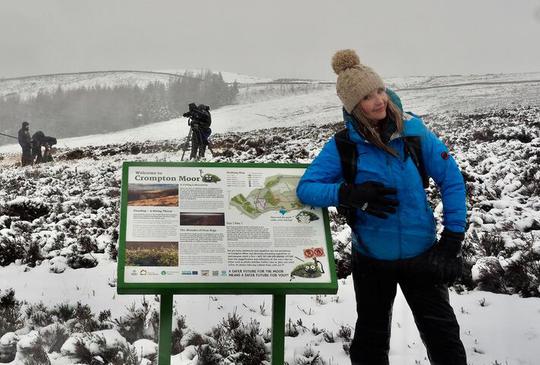
Greater Manchester's Crompton Moor on BBC’s Countryfile
Did you tune into Countryfile last Sunday night? You might have spotted Greater Manchester's exciting project to help stop flooding across our city region.
Leaky dams, tree planting and Sphagnum moss pwere featured on Sunday’s Countryfile as part of a pilot project in Crompton Moor, Oldham aiming to show how effective natural methods can be for preventing flooding.
The project is a partnership between City of Trees, the Environment Agency, EU LIFE IP Natural Course programme, Oldham Council, The Unity Partnership (Local Lead Flood Authority), Moors for the Future, the Friends of Crompton Moor and the Manchester Metropolitan University.

Helen Skelton, Countryfile presenter
Three natural flood management methods are being trialled on the moor to reduce the impact of flooding on the communities in the valley below.
The measures were featured on Sunday’s Countryfile programmed aired on BBC One, presented by Helen Skelton.
Crompton Moor is part of the South Pennines and covers an area of around 70 hectares, it is located in the north east of Oldham close to the border with Rochdale. The Old Brook watercourse flows through the moor and feeds into the River Beal which passes through the towns of Crompton and Shaw.
The peatland has been degraded over the centuries by mining, drainage works to allow grazing, pollution from neighbouring industry and wildfires. As a consequence, the moor is now less able to store water, which is needed to help reduce the risk of flooding following heavy rainfall to settlements adjacent to the River Beal.
Since 2018 over 9,000 Sphagnum moss plugs have been planted by volunteers to help soak up excess water on the moor. Sphagnum moss acts as an amazing ‘super sponge’ and can hold up to 26 times its weight in water. The impact of the planting is being monitored and different species of sphagnum are being trialled.
City of Trees is also undertaking a significant programme of tree planting with over 4,000 trees planted in the last 3 years with the aim of intercepting rainfall which will slow and reduce the amount of water that enters the Old Brook and its tributaries.
In one area 18 test plots have been set up with Manchester Metropolitan University undertaking monitoring. This long term experiment will assess the impact the trees have on the amount of rainwater that runs off the slope where they have been planted.
Elsewhere trees have been planted next to the Old Brook to help intercept rainwater directly running into the river and to stabilise the banks to reduce erosion, this is known as ‘riparian’ planting.
As a final ‘flood busting’ measure, five ‘leaky’ dams were built to slow the flow of water in the Old Brook and one of its tributaries. Constructed from tree trunks that were selectively felled in the conifer plantations on the moor, these structures are able to hold back water in storage areas behind the dams during heavy rainfall events. This stored water is then slowly released over a longer period of time than a free-flowing river, which reduces the river’s ‘peak’ downstream helping to lower the risk of flooding.
Pete Stringer from City of Trees comments; “Crompton Moor provides a fantastic opportunity to test and show how nature-based solutions such as trees, peatland and leaky dams can contribute to reducing flood risk.”
He adds; “However, these measures need to be done on a much bigger scale if we are going to achieve a real benefit to those communities that are at vulnerable to flooding.”
David Brown Senior Adviser in Flood Risk Management with the Environment Agency said: "It’s really exciting to have completed this innovative project that both reduces risk and provides significant opportunities for wildlife.
“Natural flood management can make a vital contribution to flood resilience, alongside more traditional approaches, and allows us to keep meeting the ambitions set out in our Flood and Coastal Erosion Risk Management Strategy.
“We continue to be extremely grateful to our partners, volunteers and the local community who are helping to deliver these important schemes. It’s a numbers game though, and we are keen to work with even more partners to implement additional schemes across Greater Manchester. ”
Find out more about the Crompton Moor project on the City of Trees website.
Discover more about natural flood management on the Natural Course website.
Watch Countryfile from 7th February on BBC iPlayer.
Natural Course: an integrated approach to water management in Greater Manchester and beyond
Contributed by Mark Turner
Environment Agency outlines recovery plans following floods
Contributed by Grace Fleming
Contributor Profile
Jennifer Lane is Campaign Manager for the IGNITION Project and Natural Course.




